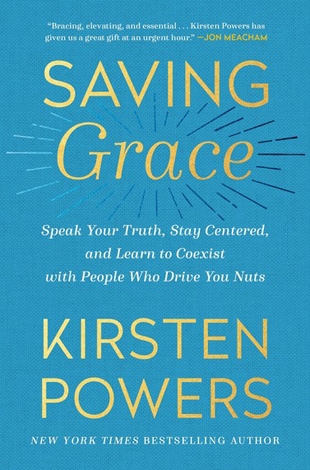“Grace is good for the world, but it’s also really, really good for you,” writes Kirsten Powers at the end of this interesting book made necessary by our dangerous and toxic political and cultural environments.
Powers’ book is about grace from beginning to end. Page one of chapter 1 includes this: “Grace is what lets us stumble, fall, get back up, and try again. Grace is what welcomes you back after you have failed someone or failed yourself.” Also, “True grace is otherworldly. It goes against every instinct we have to seek revenge for wrongs or to shame and humiliate people who have acted immorally or unethically.”
She chronicles all of the ways that our society is broken — “a nation divided that we cannot stand.” Fault lines have been created by society leaders, politicians, and opinion-makers, but Powers is clear that we all participate, either to continue the fighting or to heal it. She says that the change of grace is in the hands and lives of ordinary people:
“It’s important to have the hard conversations with the people in your life about racism, misogyny, and other forms of bigotry. At the same time, everyone needs to create space for bridge builders to do this work and not attack them or shame them for having relationships with people from opposing political and ideological camps. We all have different roles to play in the world.”
She quotes a variety of progressive Christian thinkers, including Richard Rohr, Nadia Bolz-Weber, Congressman John Lewis, Howard Thurman, Barbara Brown Taylor, and Brian McLaren.
Powers used to work at Fox News, and today she is a senior political analyst for CNN. She advises readers to avoid social media: “If you aren’t locked in to binary thinking already, you will be after ten minutes on Twitter. The people who get the most attention have a single-minded focus on prosecuting their cases and destroying those who believe the 'wrong' things.”
She offers healthier alternatives, again from her own experience: “Since I was working to unlearn the binary way I experienced the world, I thought it might help if I dialed down my Twitter use…. I started to feel calmer and less agitated in a matter of days. The hours I used to spend on Twitter I now devoted to integrating other healthier practices into my life like meditation, centering prayer, journaling, and hiking to connect with nature. I felt more grounded and present in my offline (real) life.”
Powers addresses other social ills experienced through television news-watching, which produces in many people chronic stress and recurring trauma. Her advice is usually direct and to the point: “Just press mute, change the channel, or turn off the TV. Don’t give prime real estate in your brain to someone who doesn’t deserve it.”
“Binary thinkers” in general are to be avoided at all costs, in favor of expressing healthy concern and real engagement with people. Powers even criticizes her own binary ways of thinking, demonstrated in an earlier book and speeches that she gave within the last decade. She admits to sneering at others and to refusing to listen. “Good Lord in Heaven. I do not know who this person was who believed this,” she says, chronicling a long list of personal faults.
Replacing earlier arrogance and presumption, Powers says that she is trying to learn humility. This book should help many others who want to do the same, but have been without proper guidance as to how to get started.
